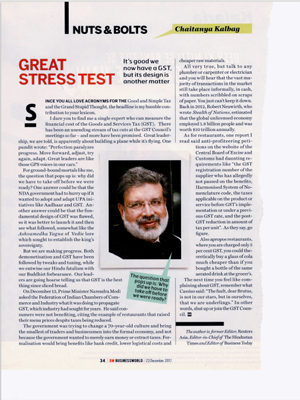GREAT STRESS TEST
[Business World]
Published date: 23 Dec 2017
Since you all love acronyms for the Good and Simple Tax and the Grand Stupid Thought, the headline is my humble contribution to your lexicon.
I dare you to find me a single expert who can measure the financial cost of the Goods and Services Tax (GST). There has been an unending stream of tax cuts at the GST Council’s meetings so far – and more have been promised. Great leadership, we are told, is apparently about building a plane while it’s flying. One pundit wrote: “Perfection paralyzes progress. Move forward, adjust, try again, adapt. Great leaders are like those GPS voices in our cars.”
For ground-bound mortals like me, the question that pops up is: why did we have to take off before we were ready? One answer could be that the NDA government had to hurry up if it wanted to adopt and adapt UPA initiatives like Aadhaar and GST. Another answer could be that the fundamental design of GST was flawed, so it was better to launch it and then see what followed, somewhat like the Ashvamedha Yagna of Vedic lore which sought to establish the king’s sovereignty.
But we are making progress. Both demonetization and GST have been followed by tweaks and tuning, while we entwine our Hindu fatalism with our Buddhist forbearance. Our leaders are going hoarse telling us that GST is the best thing since sliced bread.
On December13, Prime Minister Narendra Modi asked the Federation of lndian Chambers of Commerce and Industry what it was doing to propagate GST, which industry had sought for years. He said consumers were not benefiting, citing the example of restaurants that raised their menu prices despite taxes being reduced.
The government was trying to change a 70-year-old culture and bring the smallest of traders and businessmen into the formal economy, and not because the government wanted to merely earn money or extract taxes. Formalisation would bring benefits like bank credit, lower logistical costs and cheaper raw materials.
All very true, but talk to any plumber or carpenter or electrician and you will hear that the vast majority of transactions in the market still take place informally, in cash, with numbers scribbled on scraps of paper. You just can’t keep it down. Back in 2012, Robert Neuwirth, who wrote Stealth of Nations, estimated that the global unlicensed economy employed 1.8 billion people and was worth $10 trillion annually.
As for restaurants, one report I read said anti-profiteering petitions on the website of the Central Board of Excise and Customs had daunting requirements like “the GST registration number of the supplier who has allegedly not passed on the benefits, Harmonised System of Nomenclature code, the taxes applicable on the product or service before GST’s implementation or under a previous GST rate, and the post GST reduction in amount of tax per unit”. As they say, go figure.
Also apropos restaurants, where you are charged only 5 per cent GST, you could theoretically buy a glass of cola much cheaper than if you bought a bottle of the same aerated drink at the grocer’s. The next time you feel like complaining about GST, remember what Cassius said: “The fault, dear Brutus, is not in our stars, but in ourselves, that we are underlings,” In other words, shut up or join the GST council.






